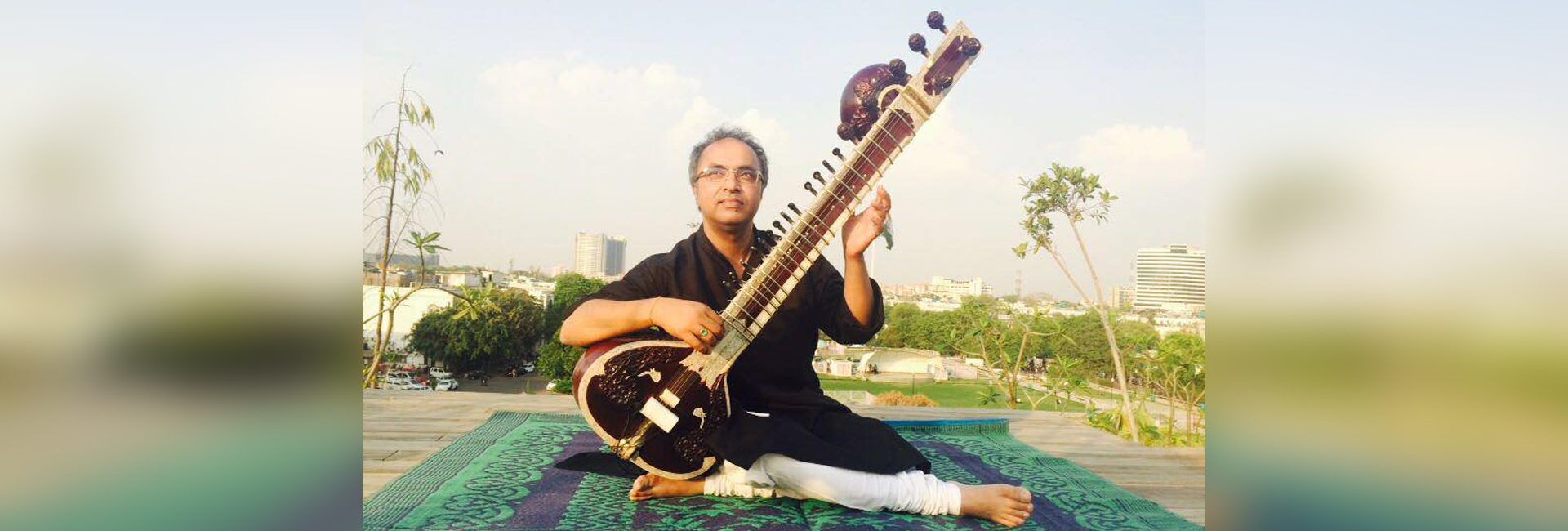(December 19, 2024) At the age of 19, Ustad Zakir Husain travelled to the US for the first time. “It was the most important decision of my life,” he said, decades later, in an interview with Karan Thapar. “In some ways, the decision was already made for me. My father got sick and someone had to replace him for the first few concerts. So I ended up going and playing my first concert at the Fillmore East, with Pandit Ravi Shankar ji.” When his concerts were finished, Pandit Ravi Shankar asked him a question that would change his life. “He said, ‘What do you want to do now’? I said I had to go home. So he said, ‘You’re here, and there is an opening at the University of Washington for an Assistant Professor in Music at the World Music Department. They want you, and it’s a great opportunity, so why don’t you go? Pandit Ravi Shankar ji helped me make that decision.”
From that moment on, the whole world changed for the young Global Indian – the son of the legendary Ustad Alla Rakha – whose genius was already recognized back in India. “The whole world opened up to me,” Hussain said. “I did not realise there was so much there which we don’t have in India, available to you at your fingertips.” Like most musicians from India, Hussain admitted, he left his home country with an attiude. “I am the best, I am the keeper of a 5000-year-old tradition. Nobody has this in the world. We are the best, we are unique, we are teachers. We don’t realise that there are equally old traditions all over the world. Suddenly, I had to very quickly become very humble. I would stand in front of the mirror and say ‘I’m humble, I’m humble 500 times,” he laughed.
Ustad Zakir Hussain had, fortunately, inherited his father’s immensely liberal outlook, and when he realised how much the world had to offer, he immersed himself into the “awakening that was taking place on the West Coast in America.” He threw himself into studying African music, Middle Eastern music and Indonesian gamelan, and went on to do his PhD. That wasn’t all. The US also brought him a new network of global masters, and the opportunity to collaborate with some of the biggest names like Mickey Hart from Grateful Dead, Shakti, and Van Morrison. This was the start of fusion music and Ustad Zakir Hussain joined its band of legendary pioneers, including Hart, the inimitable John McLaughlin, Herbie Hancock and Charles Correa. He went on to compose music for films like Apocalypse Now, and for the opening ceremony of the 1996 Atlanta Olympics. In the process, the Ustad brought the beauty of India’s ancient music to the world, as well as classical traditions from around the world to India.
On December 16, Ustad Zakir Hussain, undoubtedly one of the world’s greatest musicians, passed away in San Francisco at the age of 73, after a prolonged battle with idiopathic pulmonary fibrosis. “His unique mastery of rhythm allowed him to cross borders freely and create authentic connection between different genres of music,” his family said, in the statement. Ustad Zakir Hussain has been recognized all over the world, won multiple Grammy awards, the Padma Shri, the Padma Bhushan, the Padma Vibhushan, the Sangeet Natak Akademi Award, the Kyoto Prize (Laureate in Arts and Philosophy) and the Aga Khan Music Awards for lifetime achievement.

Ustad Zakir Hussain. Photo: Jim B
The making of the Ustad
It’s the Padma Shri he holds closest to his heart, not just because of the award itself, but because of how he got the news. The Padma Awards were traditionally announced on the night of January 25th, before newspapers went to print on January 26th. That night, at 3 am, Hussain was playing a concert, again with Pandit Ravi Shankar, at St Xavier’s College in Mumbai. His father Ustad Alla Rakha, also his guru and idol, sat in the front row. Suddenly, a man rushed through to where his father sat, waving a newspaper, a “big no-no in Pandit Ravi Shankar ji‘s concerts.” Ustad Allarakha heard what the man said, jumped up and ran to the announcer. When Pandit Ravi Shankar finished playing, the announcer whispered in his ear. “I was wondering what was going on, if someone had died,” Hussain recalled. Pandit Ravi Shankar smiled when he heard the news, looked at his young tabla player and announced to the audience, “Ustad Zakir Hussain has just been awarded the Padma Shri. It was the first time he called me Ustad. Everybody erupted and my father jumped up on to the stage with a garland… it was a very special, emotional experience for me.”
Growing up, it was his father he wanted to please, more than anybody else. When he was brought home for the first time as an infant, his father took him in his arms, and was, traditionally, supposed to recite a prayer in the newborn’s ear. “Instead of a prayer, my father said rhythms,” Hussain said, during a talk at Google.
“He did this whispering in my ear until I was two and then promptly gave me away. He did a reverse psychology thing on me,” laughs Hussain. “He went back to his students and did not even look at me! So, at the age of seven, I was giving my first concert and it was all to get his attention.”

Ustad Zakir Hussain with his father, Ustad Alla Rakha
That was the day his father sat him down and asked him if he truly wanted to play the table. Hussain said yes, that was all he wanted. And then Ustad Allarakha Khan became his guru, with lessons taking place through the night. “The masters always practiced late at night, they would give concerts, then come home and continue practicing. So the night was when he taught me and teaching was not always about banging on the drums. He would talk to me, tell me stories and myths and legends of the old masters.” This would continue till 3 am sometimes, and Hussain would rush to school in the morning. “When would I sleep? In school,” he chuckles.
The disciple, the genius
Hussain’s true learning took place with his father late at night, learning myths and stories of the great masters. “We grew up worshipping Saraswati, the goddess of music, and we believe we are the priests of Saraswati. To us, music has been handed down from Lord Shiva’s Damru to Lord Ganesha’s pakhwaj to Krishna’s flute.” It was all quite out of place in a conservative Muslim household. “What are you doing,” said his mother, livid, when Ustad Alla Rakha whispered rhythms to his newborn, instead of the traditional prayer. But to the Ustad, music was prayer. Hussain’s mother was also alarmed by the idea of her son growing up to be a tabla player. Musicians were not well-paid, classical music did not have much reach or even respect at that time, and moreover, the tabla was seen as a “second-class instrument.”
His mother made sure Hussain could at least fall back on a good education, sending him to a good school and making sure he learned English fluently. The school was Catholic, so Hussain was also attending the Saturday masses and learning about a whole other religion. “It was confusing for me as a child, figuring out where my allegiance lay. But I figured out that my only allegiance was to music.”

Ustad Zakir Hussain with Pandit Ravi Shankar
To that pursuit he dedicated himself fully, mind, heart, body and soul. Entrusted with his father’s communications, he would offer himself in place of the Ustad if there was a scheduling conflict, and by the age of 12, had started giving concerts. Those early days were fraught with struggle. Despite Ustad Alla Rakha’s fame, money was sometimes tight and Hussain would travel on local trains constantly. If he couldn’t find a seat, would spread newspapers on the floor and lie down on them, his instruments in his lap, so nobody’s feet would touch them.He even recalls one concert in a remote town, which he arrived at after two nights alone on a train, with only his tabla. To add insult to injury, the organizers made off after the show without paying the musicians, leaving the 12-year-old Hussain alone in a strange town with no money.
“I remember as a 13-14 year old, going to play at rich people’s homes, and I’d be made to wait in their kitchens, and afterwards, we were given leftover food to take home with us.”
From the East to the West Coast
In America, all that changed. while he learned humility in terms of his craft and tradition, Hussain was soon sought after by the top musicians of the time, and getting invitations to compose for Hollywood. “I wanted to explore every possible venue, from playing fusion music with the Grateful Dead and Shakti, to composing for films.” It was Mick Hartley of Grateful Dead who brought the opportunity for Apocalpyse Now. “The last 12 minutes, where Marlon Brando gets killed, that was done totally by me. I also did a lot of Merchant Ivory films and the music for the 1996 Atlanta Olympics. The opening piece for the film was just us – it involved 400 drummers and 100 singers,” Hussain said.

Shakti, at the Montreux Jazz Festival, 1976, featuring John McLaughlin, Vikku Vinayakram, L Shankar and Ustad Zakir Hussain. Photo: Image by : Andrew Putler/Redferns via Getty / Forbes
He also met his wife, Antonia Minnecola in the US. Although she is a story in herself, Minnecola was of Italian heritage and had a deep fascination for Indian culture. She had come to the University of Washington to study Kathak, which is where Hussain saw her the first time and “asked her out for a burger.” The families weren’t in favour at first, but it was his liberal father who finally made sure the couple got their fairytale ending.
By the age of 40, Hussain had already become a global icon. “Sometimes, I worry about where I go next,” he said. “But the fact is, I see my father, who is 81, who sits with his tabla and becomes 41. He becomes young again because is always learning. And like him, I have miles to go before I sleep.”
- Discover more fascinating Stories





